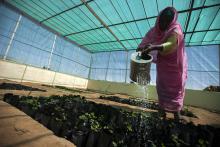Land Library Search
Through our robust search engine, you can search for any item of the over 73,000 highly curated resources in the Land Library.
If you would like to find an overview of what is possible, feel free to peruse the Search Guide.
/ library resources
Showing items 1 through 9 of 4250.La production halieutique et aquacole mondiale a atteint un niveau sans précédent, la production d’animaux aquatiques issue de l’aquaculture dépassant pour la première fois celle de la pêche de capture, selon un nouveau rapport de l’Organisation des Nations Unies pour l’alimentation et l’agricult
Countries face severe local and global climate risks with grave social, economic, and environmental costs.
Despite the existence of a legal framework defining the right to fair compensation, and notwithstanding the vast literature on transnational and domestic land deals, no theory has been developed so far to allow for a specific analysis of the economics of fair compensation in large-scale land acqu
Customary land institutions (CLIs) are social institutions that define local land governance in communities. Strengthening community rights continues to be an essential land policy goal, and several studies have focused on ways to improve local land governance through CLIs.
The severity of the population dislocation and destruction of housing, land and property (HLP) in the Ukraine war has driven efforts for starting reconstruction planning prior to the war's end.
L’urbanisation progresse dans de nombreux pays et ce rapport montre qu’elle modifie les systèmes agroalimentaires d’une façon qu’il n’est plus possible d’appréhender sous l’angle de la simple dichotomie entre milieu rural et milieu urbain.
Glocalizing land-use and forest governance implies in advancing equitable research partnerships between institutions in the Global South and Global North, and strengthening a community of practice for critical enquiry and engagement in partnerships for sustainable development.
Au Sénégal, malgré d’évidents progrès législatifs en matière de parité de genre, les femmes restent encore minoritaires, voire absentes des instances stratégiques et opérationnelles de gouvernance foncière au niveau communal.







